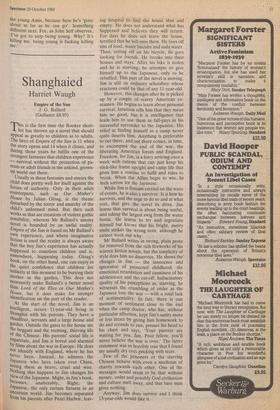Shanghaied
Harriet Waugh
Empire of the Sun J. G. Ballard (Gollancz £8.95)
This is the first time the Booker short- list has thrown up a novel that should appeal as greatly to children as to adults. The hero of Empire of the Sun is 11 when the story opens and 14 when it closes, and during those years he fulfils one of the strongest fantasies that children experience — survival without the protection of pa- rents or adult friends in the unkind, grown- up world out there.
Usually in these fantasies and stories the child does pretty well for itself against the forces of authority. Only in their adult counterparts, such as Our Mother's House by Julian Gloag, is the theme disturbed by the terror and anarchy of the child's unformed mind. But then such works as that are creations of violent gothic sensibility, whereas Mr Ballard's uncosy novel is bounded by an awful reality. Empire of the Sun is based on Mr Ballard's own experience, and where imaginative fiction is used the reader is always aware that the boy Jim's experience has actually happened to countless children and is, somewhere, happening today. Gloag's book, on the other hand, one can enjoy in the quiet confidence that .children are unlikely at this moment to be burying their mother in the garden. This does not necessarily make Ballard's a better novel than Lord of the Flies or Our Mother's Xlouse, but it does make for stronger identification on the part of the reader. At the start of the novel, Jim is an intelligent, secure 11-year-old living in Shanghai with his parents. They have a chauffeur, servants and a large house and garden. Outside the gates to the house are the beggars and the teeming, thieving life of the Chinese. His parents' social life is expatriate, and Jim is bored and alarmed by films about the war in Europe. He does not identify with England, where he has never been. Instead, he admires the Japanese who have taken over China, seeing them as brave, cruel and wise. Nothing that happens to Jim changes his view of the Japanese. Might, in Jim's book, becomes, unalterably, Right; the Japanese, the only certain fixtures in an Uncertain world. Jim becomes separated from his parents after Pearl Harbor, leav-
ing hospital to find the house shut and empty. He does not understand what has happened and believes they will return. For days he does not leave the house, terrified that he will miss them. He lives off tins of food, water biscuits and soda water. Then, setting off on his bicycle, he goes looking for friends. He breaks into their houses and stays. After his bike is stolen and he is starving, he attempts to give himself up to the Japanese, only to be rebuffed. This part of the novel is moving; Jim is still an ordinary schoolboy whose reactions could be that of any 11-year-old.
However, this changes after he is picked up by a couple of scarey American ex- seamen. He begins to learn about personal survival. Intuition tells him that they mean him no good, but it is intelligence that leads him to use them as fall-guys in his successful surrender to the Japanese. His relief at finding himself in a camp never quite deserts him. Anything is preferable to out there, and out there comes, in time, to encompass the end of the war, the liberating American forces and England. Freedom, for Jim, is a lorry arriving once a week with rations that can just keep his stick-like frame upright and camp life that gives him a routine to fulfil and rules to break. When the Allies begin to win, he feels sorrow for the Japanese.
While Jim is flotsam carried on the wave of events, he is also a survivor. It is how he survives, and the urge to do so and at what cost, that give the novel its drive. Jim learns that survival is about being useful, and taking the largest swig from the water bottle. He learns to try and ingratiate himself but knows that his bright, merry smile strikes the wrong note, although he cannot work out why.
Mr Ballard writes in strong, plain prose far removed from the rich fireworks of his science fiction novels, but the simplicity of style does him no disservice. He shows the changes in Jim — the innocence and ignorance of protected childhood, the emotional retardation and canniness of his adolescence and the cut-off, hallucinatory quality of his perceptions as, starving, he witnesses the crumbling of order as the Japanese lose the war — with a total lack of sentimentality. In fact, there is one moment of sentiment close to the end when the camp doctor, who has, without particular affection, kept Jim's sanity more or less intact by giving him homework to do and errands to run, presses his head to his chest and says, 'Your parents are waiting for you, Jim. Poor fellow, you'll never believe the war is over.' The latter statement was so horribly true that I found my usually dry eyes pricking with tears.
Few of the prisoners or the starving Chinese behave with even a modicum of charity towards each other. One of the messages would seem to be that without money, order and possibly God civilisation and culture melt away, and that bare man gives nothing.
Anyway, Jim does survive and I think 13-year-olds would like it.


















































 Previous page
Previous page